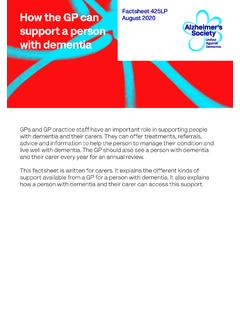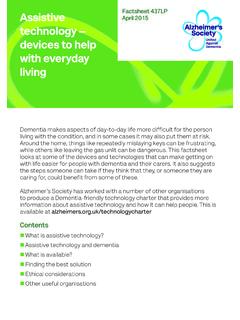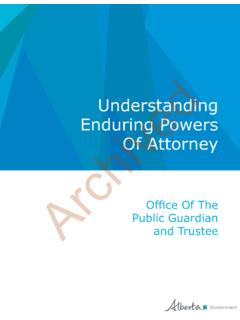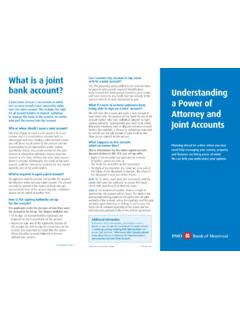Transcription of Factsheet 472LP Lasting power April 2020 of attorney
1 Lasting powerof attorneyFactsheet 472LP April 2020A Lasting power of attorney (LPA) is a legal tool that you can use to appoint someone you trust to make decisions on your behalf if you become unable to make them yourself. The person you appoint is known as an attorney . They can manage your finances or make decisions about your health and welfare. This Factsheet explains what an LPA is and why you might want to make one. It also has some practical advice and information about how to appoint someone as an attorney , and what powers you can give information in this Factsheet is for people living with dementia in England and Wales. It is not for people living in Northern Ireland, where the laws about powers of attorney are different. For information about the laws in Northern Ireland see Factsheet NI472, enduring power of attorney and power of attorney2 Contents n Planning ahead nWhat is a Lasting power of attorney ?
2 Property and affairs LPA Health and welfare LPA enduring power of attorney (EPA) General or ordinary powers of attorney What happens if you don t make an LPA? nThe benefits of making a Lasting power of attorney nWho can be an attorney ? nWhat an attorney has to do Having multiple attorneys Giving gifts Expenses nHow to make a Lasting power of attorney Signatures required Next steps nOffice of the Public Guardian (OPG) nOther useful organisationsLasting power of attorney3 Many people with dementia will reach a point where they can no longer make some decisions for themselves. This is known as lacking mental capacity to make those decisions. When this happens, someone else often a carer or family member will need to decide on behalf of the person with aheadAfter a diagnosis of dementia it is a good idea to plan for the future.
3 It may be hard, but it can also be reassuring to know that you have made your wishes and preferences clear. It can also help you to know that you have chosen people you trust to make decisions for you when you need them to. Planning ahead can make things easier for your family and friends as powers of attorney are not the only way to plan for the future. You can make arrangements, choices and decisions about your property, finances, future care and medical treatment. For example, you can: nmake a will (or update a will you have already made) nmake sure that your finances are in order. This might include getting financial advice (see Other useful organisations on page 17 for some suggestions about how to do this) nmake an advance decision or advance statement. These allow you to refuse certain medical treatments or to express your preferences about your future care and things that are important to more information see Factsheet 463, Advance decisions and advance statements and booklet 1510, Planning power of attorneyLasting power of attorney4 What is a Lasting power of attorney ?
4 A Lasting power of attorney (LPA) is a legal tool that lets you choose someone (or several people) you trust to make decisions for you. This person is referred to as your attorney , and you can choose what decisions they can make for are two different types of LPA:1 Property and affairs LPA. This lets the person you appoint make decisions about your property and Health and welfare LPA. This lets the person you appoint make decisions about your care and medical can choose to make both types or just one. You can appoint the same person to be your attorney for both, or you can have different LPAs must be registered at the Office of the Public Guardian (OPG) before they can be used. The OPG is a government body that is responsible for the registration of LPAs (for more information see Office of the Public Guardian (OPG) on page 16).
5 After a diagnosis of dementia it is a good idea to plan for the future. It may be hard, but it can also be reassuring to know that you have made your wishes and preferences clear. It can also help you to know that you have chosen people you trust to make decisions for you when you need them need to be over 18 and have what is called mental capacity to make an LPA. This means that you must be able to understand what an LPA is and what making one means. Dementia is progressive which means that it will become more difficult for you to make plans and decisions over time. It is therefore a good idea to start thinking about making an LPA as soon as you more information about mental capacity see Factsheet 460, Mental Capacity Act power of attorney5 Talking about LPAs with your family or close friends can be a good way to think about what you want for the future.
6 It will also help them to know and understand your wishes and and affairs LPAA property and affairs LPA covers decisions about your finances and property. If there comes a time when you can t manage your finances anymore, the person you appoint as your attorney will be able do this for you. This can include managing your bank accounts, paying your bills, collecting your income and benefits, or selling your house. However, if you want to, you can limit the decisions the attorney can make, or when they can make are two different options for property and affairs LPAs. You must select one of these on the form. These two options are explained below: nYour attorney can only make decisions for you when you can t make them for yourself. nYour attorney can also make decisions that you can make for yourself, if you allow them to.
7 This can be a good way to give yourself extra and welfare LPAA health and welfare LPA allows your attorney to make decisions on your behalf about your health and care, if you are unable to make these decisions for yourself. A health and welfare attorney could make decisions about where you live, for example, or your day-to-day care and medical can also give your health and welfare attorney the power to accept or refuse life-sustaining treatment on your behalf. You will be asked whether you wish to do this or not on the form, and you will need to state what you choose clearly. This is a very significant responsibility. Take time to discuss this question with the person you ve chosen as your power of attorney6 You may have already refused certain future treatments in an advance decision before making a health and welfare LPA.
8 If so, you need to think about how the advance decision and the LPA will work together. The LPA will override your advance decision if you give your attorney the power to accept or refuse treatment that is covered by your advance decision. You may need to take legal advice if you are concerned about any confusion between your advance decision and your more information about advance decisions see Factsheet 463, Advance decisions and advance a property and affairs LPA, a health and welfare LPA cannot be used to make decisions about your welfare or treatment that you can make for power of attorney (EPA) enduring powers of attorney (EPAs) were in place before Lasting powers of attorney (LPAs). EPAs only cover decisions about finances and property (like the property and affairs LPA). They do not cover health and welfare s not possible to make an EPA anymore.
9 However, if you made one before 1 October 2007 it can still be used (as long as it was correctly filled in).If you have a valid EPA, you don t need to make an LPA unless you want to make changes to it. For example, you may want to change who can make decisions for you or change what powers you give them. If you have an EPA, you might also want to think about making a health and welfare LPA to cover decisions about your care and medical attorney will need to register your EPA with the OPG if you lose mental capacity to manage your finances. Your attorney can also use it to make decisions with your permission if you still have mental capacity to make those decisions yourself (unless your EPA says something different). Lasting power of attorney7 General or ordinary powers of attorneyIn addition to LPAs, you may come across something called a general or ordinary power of attorney .
10 These can also give someone permission to manage your property and finances (not health and welfare) on your behalf. They might be used, for example, if you are going abroad for some time and want someone to look after things while you are unlike an LPA or EPA, these cannot be used if you become unable to make decisions about your property or finances in the future. When you have dementia, an LPA is a better option as it allows your attorney to make or continue to make certain decisions for you if you cannot make them happens if you don t make an LPA?Although it can be difficult to think about the future, and to plan for life with dementia, it is important. Planning can make things much easier as your condition you don t make an LPA, and later become unable to make certain decisions for yourself, there may come a time when no one can legally make those decisions for you.















